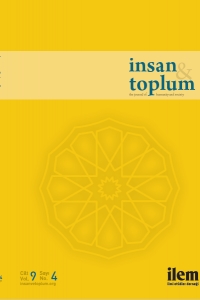Abstract
Günümüz toplumları birbirlerini takip ederek, gözlemleyerek, kopyalayarak her gün daha akıllı olma yolundalar; bilgi artışı zaten hızlanıyor ama hepimizin ne bildiğini biliyor muyuz? Ya da daha eleştirel olarak, birinin öğrendiği her şeyden yararlanabilir miyiz? Günümüzün literatür, tekno-sosyal etkileşim(leri) ekonomik, sosyal, kültürel ve politik durumların dengesizlikler tarafından yönlendirilen çok motive ve çok yönlü bir normatif fenomen olarak yorumlamaktadır (felsefi olmayan gerçekler). Bu çalışmayla beraber, yine de, geçerli literatür, “modern” sosyolojik varsayımları vurgulamamakta, bir Tekno-ütopyacı (Nietzschean düşüncesi) veya en azından egemen bir teknolojik-determinist (Devlerin dilekleri) olarak hareket etmektedir. Bu bakış açısıyla, bu çalışma Teknokalistler ile ilgili sorunları tartışmak için Teknokalizm ilkeleriyle tekno-sosyal etkileşimi analiz eden farklı bir yaklaşım benimsemiştir. Bu makale, Teknokratikçilerin isyanı, özgürlüğü ve tutkusu tekno-sosyal mücadelelerle yönetilen saf “modern” teknisyenler olmaktan kurtulmak istediklerini savunuyor. Bu çalışmada, yeni teknolojik alan bakış açıların bir tuhaf “postmodern” ahlaki amaç (ör. Gözetim yönetişimini durdurma) almadan mevcut ve gelecekteki kontrolörlerden kaçınmamız gerektiğini mecazi olarak öngörecektir.
Keywords
Teknolojinin sosyolojisi teknolojik determinizm teknorealizm eğitim teknolojisi eğitim felsefesi.
References
- Black. L. B. (1960). The people and the court. New York, NY: Macmillan
- Bogard, W. (1996). The simulation of surveillance: Hypercontrol in telematic societies. Cambridge, MA: Cambridge University Press.
- Boyle, J. (2008). The public domain: Enclosing of the commons of the mind. New Haven, CT: Yale University Press.
- Butler, S. (1863). The book of the machines. Moscow, Russia: Dodo Press
Abstract
Societies are on the way to becoming smarter every day by following, copying, and observing one another; the increase of knowledge is already accelerating, but do we know what all of us know? Or more critically, are we able to benefit from everything one has learned? The literature normatively postulates techno-social interactions to be a multi-motivated and multi-consequential phenomenon driven by imbalances in economic, social, cultural, and political situations (non-philosophical facts). Nevertheless, the literature has not highlighted its modern sociological assumptions; it acts as a Techno-utopianist (Nietzschean thoughts) or at least as a dominated technological-determinist (Giant wishes). In this sense, this study takes a different approach to analyzing techno-social interactions using the principles of Technorealism to discuss the issues that concern Technorealists. This paper argues that Technorealists wish to break loose from being pure modern technophiles whose revolts, freedoms, and passions are governed by techno-social struggles. The paper shall metaphorically envisage the extent to which current and future controllers should be avoided without taking any peculiar postmodern moral objective (e.g., stop surveillance governance).
Keywords
Sociology of technology technological determinism technorealism education of technology philosophy of technology.
References
- Black. L. B. (1960). The people and the court. New York, NY: Macmillan
- Bogard, W. (1996). The simulation of surveillance: Hypercontrol in telematic societies. Cambridge, MA: Cambridge University Press.
- Boyle, J. (2008). The public domain: Enclosing of the commons of the mind. New Haven, CT: Yale University Press.
- Butler, S. (1863). The book of the machines. Moscow, Russia: Dodo Press
Details
| Primary Language | English |
|---|---|
| Subjects | Sociology |
| Journal Section | Research Articles |
| Authors | |
| Publication Date | December 21, 2019 |
| Published in Issue | Year 2019 Volume: 9 Issue: 4 |


